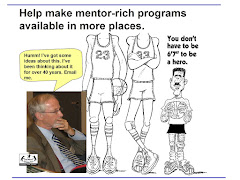 This graphic shows a small part of the network of people who have helped inner city Chicago kids move through school and into jobs and careers through the efforts of programs I've led at Montgomery Ward and Cabrini Connections since 1975. I think more programs who can build and sustain these connections should be available in big city neighborhoods. Through the Tutor/Mentor Connection and Tutor/Mentor Institute, LLC I've been trying to make that happen.
This graphic shows a small part of the network of people who have helped inner city Chicago kids move through school and into jobs and careers through the efforts of programs I've led at Montgomery Ward and Cabrini Connections since 1975. I think more programs who can build and sustain these connections should be available in big city neighborhoods. Through the Tutor/Mentor Connection and Tutor/Mentor Institute, LLC I've been trying to make that happen.Next week I'll be in Washington, DC attending the National Mentoring Summit. While I'm there I hope to connect with leaders from different cities and states. I also hope to connect with people who are not able to attend the Summit, but who will connect with me and others via Twitter and Facebook.
Use this link to connect with the Summit on Twitter. Conversations regarding the summit will use the Hashtag #Mentor2012
To connect with MENTOR on Facebook go to http://www.facebook.com/MENTORnational
 While my goal is to find partners, benefactors and corporate leaders who will support our efforts in Chicago, I also am hoping to connect with leaders who view mentoring and tutoring as a strategy for expanding the social capital of youth living in highly segregated, poverty neighborhoods of big cities. I've written articles about social capital in the past and point to research that I'm reading that show how the income of your parents and wealth of your community determines your future and impacts your performance in school. If that's true, we should be looking for ways to demonstrate the growth of the network of adults and experiences surrounding youth who participate in these programs as opposed to youth who don't have access to well-organized tutor/mentor programs.
While my goal is to find partners, benefactors and corporate leaders who will support our efforts in Chicago, I also am hoping to connect with leaders who view mentoring and tutoring as a strategy for expanding the social capital of youth living in highly segregated, poverty neighborhoods of big cities. I've written articles about social capital in the past and point to research that I'm reading that show how the income of your parents and wealth of your community determines your future and impacts your performance in school. If that's true, we should be looking for ways to demonstrate the growth of the network of adults and experiences surrounding youth who participate in these programs as opposed to youth who don't have access to well-organized tutor/mentor programs. I've been building my network of ideas, friends, peers for over 30 years. What if kids in inner city neighborhoods were able to build their own networks over a period of years and what role might tutor/mentor programs have in accelerating that process. This graphic illustrates the growth of a network over time. This PDF shows this in a much more strategic way.

Thus, my hope is that next week in Washington I'll connect with leaders who also are thinking of volunteer involvement in organized tutor/mentor programs as a strategy for building social capital for a youth, for the volunteer and for the programs that enable these connections to take place.
If you're one of these people and want to connect with me in DC, or via Twitter or Facebook, contact me and let's find time to meet. Find me on Twitter @tutormentorteam and on Facebook at http://www.facebook.com/TutorMentorInstitute








No comments:
Post a Comment